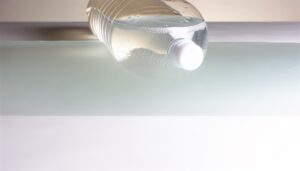How to Remove Metallic Taste From Water Bottle
To effectively remove the metallic taste from your water bottle, start by identifying the cause, such as the bottle's material or the water's mineral content. Clean the bottle using a solution of equal parts vinegar and water, letting it sit for 15 minutes, then scrub and rinse thoroughly.
Alternatively, use baking soda or lemon juice to neutralize metallic ions. Denture tablets can also effectively remove the taste.
Regular maintenance, including thorough cleaning and drying, is essential to prevent future issues. For a deeper understanding of each method and additional tips, explore the detailed guidelines.
Key Takeaways
- Clean the bottle with a vinegar and water solution, letting it sit for at least 15 minutes before scrubbing and rinsing thoroughly.
- Use a baking soda solution to neutralize metallic ions, allowing it to sit for 15 minutes before rinsing well.
- Try using lemon juice to break down metallic residues, shaking the mixture vigorously before rinsing thoroughly.
- Utilize denture tablets in warm water, letting the solution sit for 15-30 minutes before rinsing the bottle completely.
- Maintain regular cleaning with warm water and mild dish soap, ensuring all parts are dried properly to prevent mold and residual tastes.
Identify the Cause
Identifying the source of the metallic taste in your water bottle is essential for effectively resolving the issue.
First, examine the material composition of the bottle. Bottles made from stainless steel or aluminum can sometimes impart a metallic flavor.
Next, consider the age and condition of the bottle. Over time, wear and tear may cause the metal to degrade, releasing particles into your water.
Additionally, inspect any coatings or linings inside the bottle, as these can deteriorate and contribute to the taste.
Finally, evaluate your water source. Tap water with high mineral content could interact with the bottle's metal, resulting in a metallic taste.
Clean With Vinegar
To effectively eliminate the metallic taste, clean your water bottle with a vinegar solution. Start by mixing equal parts of white vinegar and water. Pour the solution into your water bottle, making sure it reaches all surfaces. Let it sit for at least 15 minutes to break down any metallic residue. After soaking, use a bottle brush to scrub the interior thoroughly. Rinse the bottle multiple times with warm water to remove any vinegar traces.
| Step | Action |
|---|---|
| 1 | Mix equal parts vinegar and water |
| 2 | Pour solution into the bottle |
| 3 | Let sit for 15 minutes |
| 4 | Scrub with a bottle brush |
| 5 | Rinse with warm water |
Following these steps guarantees a clean, taste-free water bottle.
Use Baking Soda
Baking soda effectively neutralizes metallic taste through its alkaline properties. To use this method, dissolve one tablespoon of baking soda in a cup of warm water.
Pour this solution into your water bottle. Close the bottle and shake it vigorously for about 30 seconds to guarantee thorough distribution. Let the solution sit inside the bottle for at least 15 minutes.
The alkaline nature of baking soda will interact with and neutralize the metallic ions causing the off-taste. Afterward, rinse the bottle thoroughly with clean water to remove any residual baking soda.
Repeat the process if the metallic taste persists. This method is safe, cost-effective, and leverages the chemical properties of baking soda for efficient taste removal.
Try Lemon Juice
You can use lemon juice to neutralize the metallic taste in your water bottle. Its acidic properties effectively counteract the metal ions, ensuring a cleaner taste.
Simply add a few drops to the bottle, shake well, and rinse thoroughly for a natural and safe solution.
Acid Neutralizes Metal Taste
Lemon juice, a natural acid, effectively neutralizes the metallic taste in water bottles by reacting with metal ions. The citric acid in lemon juice binds to these metal ions, forming soluble complexes that reduce the metallic taste. This chemical reaction alters the metal ions' structure, rendering them less perceptible to your taste buds. By introducing an acidic environment, you can neutralize and mask the off-putting metallic flavor.
Moreover, lemon juice's acidity also helps in breaking down residual metal particles that may adhere to the bottle's surface. This dual action not only removes the metallic taste but also contributes to a cleaner, fresher-tasting water.
Understanding this process allows you to take an informed, effective approach to improving your drinking experience.
Easy Application Method
To effortlessly eliminate the metallic taste, simply fill your water bottle with a mixture of water and a few tablespoons of lemon juice, making sure the solution thoroughly coats the interior surfaces.
Shake the bottle vigorously for a few minutes. The citric acid in lemon juice reacts with metallic residues, breaking them down.
After shaking, let the solution sit for about 20 minutes to maximize the reaction time. Rinse the bottle thoroughly with clean water to remove any remaining lemon juice and dissolved metal particles.
This method is both effective and straightforward, leveraging the natural acidity of lemon juice to neutralize unwanted metallic flavors. Repeat the process if necessary to guarantee complete removal of the metallic taste.
Natural and Safe
Harnessing the natural acidity of lemon juice offers a chemical-free and safe method to remove the metallic taste from your water bottle.
Start by squeezing half a lemon into the bottle, ensuring the juice covers the interior surfaces. The citric acid in lemon juice reacts with metal ions, neutralizing them and eliminating the metallic taste.
Fill the bottle with warm water, close it, and shake vigorously for a few minutes. Let the solution sit for about 20 minutes to allow the acid to work effectively.
Afterward, rinse the bottle thoroughly with clean water. This method leverages the natural properties of lemon juice to provide a safe and effective solution, ensuring your water bottle is free from unpleasant metallic tastes.
Apply Denture Tablets
Frequently, denture tablets can effectively eliminate the metallic taste from your water bottle through a straightforward cleaning process.
First, fill your water bottle with warm water.
Next, drop one or two denture tablets into the bottle, depending on its size.
Allow the solution to sit for about 15-30 minutes to guarantee thorough cleaning.
The effervescent action of the tablets will help dislodge any metallic residues.
After the time has elapsed, empty the bottle and rinse it thoroughly with clean water to remove any residual tablet solution.
For best results, repeat this process as needed.
This method is efficient and leverages the cleaning power of denture tablets, ensuring your water bottle remains free from unpleasant metallic tastes.
Consider Bottle Material
When addressing a metallic taste in your water bottle, it’s important to consider the material from which the bottle is made. Different materials, such as stainless steel, aluminum, or plastic, can each impart distinct flavors. If your water bottle tastes like plastic, it could be due to residual manufacturing chemicals or prolonged exposure to heat. To minimize this, try washing the bottle thoroughly with warm soapy water or using a baking soda solution to remove any lingering odors. Additionally, opting for high-quality, BPA-free plastic or switching to a stainless steel option may help improve the taste.
Stainless steel is generally inert, but lower-quality variants might introduce metallic elements. Aluminum bottles often have a liner to prevent direct contact with the metal, but this liner can degrade over time. Plastic bottles, especially when exposed to heat, can leach chemicals that alter taste.
Identifying the material helps diagnose the source of the metallic taste. If switching materials isn't an option, consider using high-quality, food-grade bottles, as they're designed to minimize flavor contamination and ensure a purer drinking experience.
Use Filtration Systems
Identifying the bottle material is only one part of the equation; employing filtration systems can effectively remove metallic tastes from your water.
You should consider using activated carbon filters, which are highly effective at adsorbing metal ions and impurities.
Reverse osmosis systems can also be a powerful option, as they force water through a semi-permeable membrane to remove contaminants, including metals.
Additionally, ion exchange filters can replace metal ions in the water with less harmful ions, improving taste.
Portable filtration options, like filter straws or bottle attachments, offer convenience for on-the-go purification.
To guarantee the best results, select a filtration system compatible with your water bottle and follow the manufacturer's guidelines for peak performance.
Regular Maintenance
To maintain your water bottle and prevent a metallic taste, you should establish a regular cleaning routine. Make sure you clean it thoroughly after each use and allow it to dry completely before storing.
This practice will minimize the buildup of residues that could affect the taste.
Cleaning Frequency
Regularly cleaning your water bottle at least once a week guarantees a hygienic drinking experience and prevents metallic tastes. Use a mixture of warm water and mild dish soap for effective cleaning. Scrub the interior with a bottle brush, making sure to pay attention to any crevices or hard-to-reach areas. Rinse thoroughly to remove all soap residues.
For stubborn metallic odors, consider adding a teaspoon of baking soda to your cleaning solution, which acts as a natural deodorizer. Make certain all components, including caps and seals, are equally cleaned. This routine not only eliminates metallic tastes but also extends the lifespan of your bottle.
Regular maintenance helps prevent buildup of bacteria and minerals, ensuring every sip is fresh and pure.
Proper Drying
Guaranteeing your water bottle is completely dry after each wash is crucial to prevent the growth of mold and eliminate residual metallic tastes. Begin by using a clean, dry towel to wipe down the interior and exterior surfaces of the bottle.
For thorough drying, place the bottle upside down on a dish rack to allow all moisture to escape. If your bottle has a narrow neck, consider using a bottle brush with absorbent bristles to reach inside. Additionally, make sure the cap and any detachable parts are dried separately.
Avoid storing the bottle with the cap on, as trapped moisture can lead to mold growth. Regularly inspect and dry all components to maintain ideal cleanliness and taste quality.
Conclusion
To sum up, addressing the metallic taste in your water bottle involves identifying the cause and utilizing effective cleaning methods such as vinegar, baking soda, or lemon juice.
Denture tablets can also be beneficial. Always take into account the bottle's material and consider switching to a filtration system.
Consistent maintenance is crucial for maintaining the freshness of your water. By following these steps, you'll address any unpleasant taste promptly and enjoy clean, great-tasting water every time.




